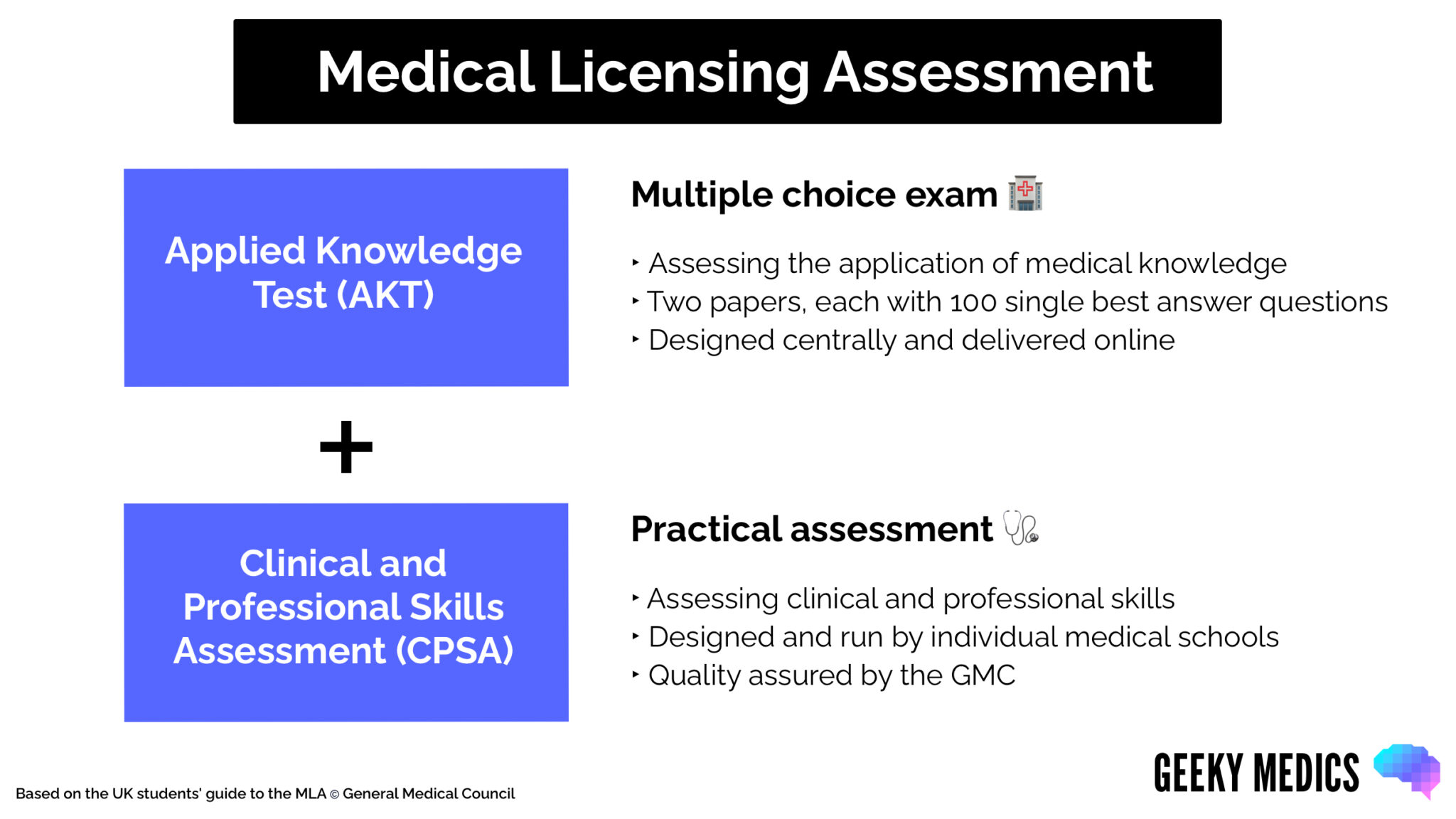- 📖 Geeky Medics OSCE Book
- ⚡ Geeky Medics Bundles
- ✨ 1300+ OSCE Stations
- ✅ OSCE Checklist PDF Booklet
- 🧠 UKMLA AKT Question Bank
- 💊 PSA Question Bank
- 💉 Clinical Skills App
- 🗂️ Flashcard Collections | OSCE, Medicine, Surgery, Anatomy
- 💬 SCA Cases for MRCGP
To be the first to know about our latest videos subscribe to our YouTube channel 🙌
Are you a medical student looking to sit the UK Medical Licensing Assessment (MLA)? If so, you’ve come to the right place! In this article, we will discuss everything you need to know about the MLA exam, including the format of the test, what topics it covers and how to revise for it.
The UK Medical Licensing Assessment (UKMLA) is a new examination that will take place from 2024 onwards. It will assess the fundamental knowledge, abilities, and behaviours required to practise safely as a doctor in the United Kingdom.
All UK medical students will be required to sit the UKMLA to join the medical register and be able to work as a doctor.
Implementing the UKMLA exam will enable the GMC to maintain high standards for UK medical students and guarantee that they are adequately equipped to practise medicine. Additionally, the UKMLA will contribute to patient safety by ensuring doctors have the information and skills necessary to practise safely.
International medical graduates
For international medical graduates, the Professional and Linguistic Assessments Board (PLAB) exams will continue (PLAB 1 and PLAB 2).
However, from 2024 PLAB will align with the UKMLA requirements and content map. If you intend to practise medicine in the United Kingdom, it is critical to understand the conditions and presentations included in the MLA.
What is the medical licensing assessment?
The medical licensing assessment is a new, two-part assessment for UK medical students consisting of:
Both components will assess knowledge and competencies outlined in the MLA content map.
The applied knowledge test will comprise 200 single-best-answer (SBA) questions across two papers (100 items each) chosen from a question bank. This online exam will be part of the medical finals assessment for students in the United Kingdom. The MLA AKT will be run nationally but delivered locally at medical schools.
The CPSA is a practical examination assessing clinical and professional skills. Medical schools will run the CPSA and align their existing practical examinations (e.g. OSCEs or OSLERs) with GMC requirements.
International medical graduates (IMGs)
As mentioned, the Professional and Linguistic Assessments Board (PLAB) exams will continue for international medical graduates (IMGs).
However, from 2024, the PLAB exams will comply with UK MLA requirements:
- For PLAB 1, all exams on or after 8th August 2024 will be based on the MLA content map.
- For PLAB 2, all exams on or after 17th May 2024 will be based on the MLA content map.
The PLAB content blueprint will be replaced with the MLA content map. The practical aspects of the PLAB examinations will not change, and there are no plans to change the eligibility criteria.
In other words:
- PLAB 1 will meet the requirements of the UKMLA Applied Knowledge Test (AKT)
- PLAB 2 will meet the requirements of the UKMLA Clinical and Professional Skills Assessment (CPSA)
As a result of aligning PLAB with the MLA requirements, patients and employers will have greater confidence in doctors new to the UK, regardless of where they were trained or educated.
Tip: International medical graduates planning to sit the PLAB exams should be familiar with the UKMLA content map and use this to guide their preparations for PLAB.
What is the format of the UKMLA?
The applied knowledge test (AKT)
The AKT will be a multiple-choice question format using single best answer (SBA) questions. The total number of questions will be 200 across two papers (100 questions each).
Table 1. Breakdown of the applied knowledge test by area of clinical practice (adapted from Medical Schools Council FAQ document).
| Paper 1 (100 questions) | Paper 2 (100 questions) |
| Cardiovascular | Cancer |
| Respiratory | Breast |
| Gastrointestinal | Palliative & end of life care |
| Medicine of older adult | Peri-operative medicine & anaesthesia |
| Neurosciences | Musculoskeletal |
| Ophthalmology | Emergency medicine & intensive care |
| Endocrine & metabolic | Ear, nose & throat |
| Renal & urology | Child health |
| Infection | Mental health |
| Dermatology | Obstetrics & gynaecology |
| Sexual health | |
| Social/population health & research methods | |
| Medical ethics & law | |
| Both papers: acute medicine, primary care, surgery & clinical imaging | |
The GMC will determine the pass standard. All candidates will take a computer-based test.
AKT question format
The applied knowledge test will use single best answer style multiple choice questions. This style of questions is already extensively used by medical schools and is the preferred format of the Medical Schools Council Assessment Alliance (MSCAA). The MSCAA operates a national question bank which medical schools can use to construct examinations.
However, questions in the medical licensing assessment AKT will not appear in other medical school exams. The AKT question bank will be a unique set of questions separate from the MSCAA bank.
The format of each AKT question will be the same:
- A clinical scenario
- A lead in question
- A set of five options, one of these is the best answer (the correct answer) to the question
The clinical and professional skills assessment (CPSA)
Medical schools will run the CPSA. The format of the CPSA will vary between medical schools. However, all medical school practical exams (OSCEs, OSLERs, etc.) must meet GMC standards for the CPSA.
How do I revise for the UKMLA?
You must be familiar with the MLA content map to revise for the medical licensing assessment. The content map sets out the content which could be tested as part of the MLA.
Conditions
The MLA content map contains a list of 311 conditions (e.g. pulmonary embolism, cardiac failure) which could appear in the medical licensing assessment, either as a question in the AKT or as part of the practical assessment.
For more information, see our list of MLA conditions with links to relevant Geeky Medics articles.
Presentations
The MLA content map contains a list of 212 patient presentations (e.g. breathlessness, chest pain) which could appear in the medical licensing assessment, either as a question in the AKT or as part of the practical assessment.
For more information, see our list of MLA patient presentations with links to relevant Geeky Medics articles.
Practical skills
The General Medical Council produces a list of practical skills which a newly qualified doctor is expected to be able to perform. These practical skills could be tested as part of the CPSA.
For more information, see our list of MLA practical skills with links to relevant Geeky Medics OSCE guides.
Areas of clinical practice
The content map is divided into 24 areas of clinical practice:
- Acute and emergency
- Cancer
- Cardiovascular
- Child health
- Clinical haematology
- Clinical imaging
- Dermatology
- Ear, nose and throat
- Endocrine and metabolic
- Gastrointestinal including liver
- General practice and primary healthcare
- Infection
- Medicine of older adult
- Mental health
- Musculoskeletal
- Neurosciences
- Obstetrics and gynaecology
- Ophthalmology
- Palliative and end of life care
- Perioperative medicine and anaesthesia
- Renal and urology
- Respiratory
- Sexual health
- Surgery
Do I need to sit the UKMLA exam?
The UKMLA will provide a uniform standard for safe medical practice in the United Kingdom. If you graduate from a medical school in the United Kingdom in the academic year 2024-25 or later, you will take the MLA before joining the medical register and starting work as a doctor (FY1).
Students will take and hopefully pass the MLA as part of their medical finals, after which they can apply to join the GMC’s medical register.
From 2024, before applying for registration with a licence to practise, IMGs will be required to pass both parts of the MLA-aligned PLAB exams and meet the GMC’s other conditions, including providing evidence demonstrating that they have an acceptable primary medical qualification, clinical experience and the necessary knowledge of English.
How much will the UKMLA cost?
The MLA will be free for UK medical students, as it will be integrated into medical school courses, and the medical school will cover the costs. However, resits may have an associated cost.
What happens with UKMLA results?
The MLA is a pass/fail examination, but students will receive scores. The GMC states that detailed feedback on individual student performance will not be available.
The GMC has stated that it will share information to better medical education and training. Whilst the GMC has stated that individual student scores would not be publically released, it appears to imply that certain data will be made public.
According to the current phrasing on the GMC website, although the GMC discourage ranking medical schools, it may be possible to construct rankings/league tables based on medical schools’ MLA performance.
References
- General Medical Council. Medical Licensing Assessment. Available from: [LINK]
- General Medical Council. MLA Content Map. Available from: [LINK]
- Medical Schools Council. The Applied Knowledge Test – FAQs for UK medical students. Published in January 2023. Available from: [LINK]





